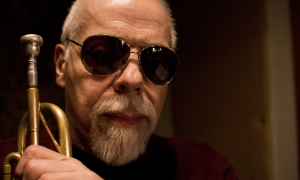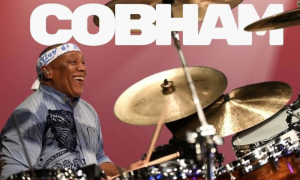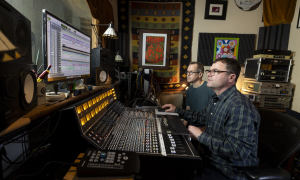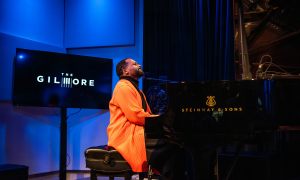That time. That sound. Those groundbreaking musicians. None more significant to us, and to the development of music, than Bobby Hutcherson.
Hutcherson’s move to New York near the beginning of his career and at the outset of the 1960s could not have come at a more consequential time for the young musician, barely into his twenties, or for Blue Note, where a substantial group of musicians about his age were leading the music in new, freer, and more experimental directions.
In addition to being swept up in an era of change, he contributed to the evolution of the music through his compositions, and to the the use of vibraphone in jazz through his expressive, ringing tone and innovations in harmony and rhythm. Not only was he leading his own dates; he was a supporting player on dozens of others.
Bobby Hutcherson was a close personal friend to Michael Cuscuna. So it seems fitting that this was the final set that Michael produced before his passing. The set features 11 sessions on seven CDs that chart his development from a more mainstream approach at first, to a very rapidly emerging expansive style of writing and performing. The disks also feature many of the most important musicians of the era, on whose dates Hutcherson was a frequent participant.
The set is more than a compilation. It’s music history. And it’s a treasure.
His very first date as a leader for Blue Note was The Kicker in 1963, though it was held back and went unreleased until 1999, possibly because Joe Henderson on saxophone steals a lot of the thunder from the date’s purported leader. From his second session, Dialogue, his growing association with new music was becoming clear. By his third date, 1965’s Components, Hutcherson’s authority over the music became established.From then on, he was writing a substantial number of the compositions on each date and the music was not limited by one style or genre, giving him ample opportunities to offer new work, up-tempo pieces, and ballads. An exceptional writer, Hutcherson had a wonderful approach on ballads and an unparalleled ability to use sustaining notes to move and blend in ways that almost completely disguise the mallet’s attack. There is never an doubt when you are hearing Hutcherson, his style is that distinctive.
A Who’s Who Of Collaborators
On these dates, Hutcherson plays alongside nothing but the most brilliant musicians from the era, including Grant Green, Duke Pearson, Bob Cranshaw, Al Harewood, Freddie Hubbard, Sam Rivers, Andrew Hill, Richard Davis, Joe Chambers, James Spaulding, Ron Carter, McCoy Tyler, Herbie Lewis, Billy Higgins, Albert Stinson, Stanley Cowell, Reggie Workman, Harold Land, Chick Corea, Reggie Johnson, Joe Sample, John Williams, and Mickey Roker.In a very short span, Bobby Hutcherson’s work declared him to be one of the most important voices on his instrument in the narrative of jazz and certainly one of the most important collaborators in forging the sound of that seminal decade. We are pleased and proud to give that era—with Hutcherson at the focal point—its due.
A Remembrance
We are all very lucky in life to find a few best friends, people with whom we connect on levels of love, empathy, sharing and friendship. Bobby Hutcherson (January 27, 1941 – August 16, 2016) was such a person in my life. Aside from being one of the most forward-thinking musicians in modern jazz and a startlingly original artist on his chosen instrument, his presence defined wisdom, humor and kindness.Bobby and I shared many projects together and a dozen or more close mutual friends, but he was one-of-a-kind. Whenever he played New York, he stayed at my apartment, and we were roommates for a wonderful week.
When my son Max was born, Bobby was his godfather. In later years, when emphysema threatened his health and stamina, we stayed in touch mostly though endless, laughter-filled telephone calls. But Bobby never quit playing no matter how debilitating his condition left him. And he never gave up his second passion—fishing, yes fishing! He loved catching them, cleaning them and cooking them.
Bobby’s priorities in life were music, laughter, his wife of some 50 years Rosemary and his sons Barry (as in the Little B of “Little B’s Poem”) and Teddy. Fittingly in great love affairs, Rosemary passed away little more than a year after Bobby. It was an honor to spend chunks of my life with Bobby and Rosemary.
~Michael Cuscuna













































